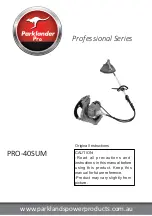
9
English
Cleaning the mu
ffl
er (Fig. 17)
Remove the mu
ffl
er and spark arrestor (if so equipped), and clean
out any excess carbon from the exhaust port or mu
ffl
er inlet every
100 hours of operation.
For long-term storage
Drain all fuel from the fuel tank. Start and let engine run until it
stops. Repair any damage which has resulted from use. Clean the
unit with a clean rag, or high pressure air hose. Put a few drops of
two-cycle engine oil into the cylinder through the spark plug hole,
and spin the engine over several times to distribute oil. Cover the
unit and store it in a dry area.
Maintenance schedule
Below you will
fi
nd some general maintenance instructions. For
further information please contact your Hitachi dealer.
Daily maintenance
○
Clean the exterior of the hedge trimmer.
○
Check the blade guide for damage or cracks. Change the guard
in case of impacts or cracks.
○
Check that the blade is sharp, and without cracks.
○
Check that the blade nut is su
ffi
ciently tightened.
○
Make sure that the blade blunt guard is undamaged and that it
can be securely
fi
tted.
○
Check that nuts and screws are su
ffi
ciently tightened.
Weekly maintenance
○
Check the starter, especially cord and return spring.
○
Clean the exterior of the spark plug.
○
Remove it and check the electrode gap. Adjust it to 0.6 mm, or
change the spark plug.
○
Clean the cooling
fi
ns on the cylinder and check that the air
intake at the starter is not clogged.
○
Check gear case is
fi
lled with grease.
○
Clean the air
fi
lter.
Monthly maintenance
○
Rinse the fuel tank with gasoline.
○
Clean the exterior of the carburetor and the space around it.
○
Clean the fan and the space around it.
TROUBLESHOOTING
Use the inspections in the table below if the tool does not operate normally. If this does not remedy the problem, consult your dealer or the
Hitachi Authorized Service Center.
Symptom
Possible cause
Remedy
Tool
Does not operate.
Foreign matter is lodged in the blade.
When there is foreign matter in the blade, use a
pair of tongs or similar tool to remove it.
Take great care since the tool may start
operating when the foreign matter has been
removed.
Sap or rust may also prevent the blade from
operating. Use a wire brush or similar tool to
remove sap or rust.
The tool does not trim well. The blade stopped because it was used to cut
a branch whose width exceeded the blade’s
cutting capacity.
NOTE
Work that will repeatedly cause the blade to
stop will eventually damage the tool.
Some garden trees have wood that is very
hard and may be beyond the capacity of the
tool even if it is of a width that is within normal
capacity. Use a pair of pruning shear to remove
thick branches before starting work.
An oblique cut may also exceed the capacity of
the tool since the length of the cut increases.
Be sure to trim thick branches at right angles.
000Book̲CH22EAP2(50ST)̲SA.indb 9
000Book̲CH22EAP2(50ST)̲SA.indb 9
2014/12/08 17:36:55
2014/12/08 17:36:55










































